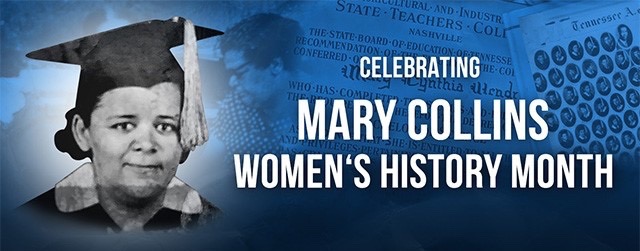NASHVILLE, Tenn. (TSU News Service) – Tennessee State University proudly celebrates Mary Collins, a 1938 graduate of then Tennessee A&I who became the first black female principal of an elementary school in East Tennessee. While her essays and poetry about life on the campus is inspiring to read and immediately transports you to a time when the college had only been in existence for 26 years, it is Collins’ legacy as an educator that has impacted and inspired two generations of educators in her family.
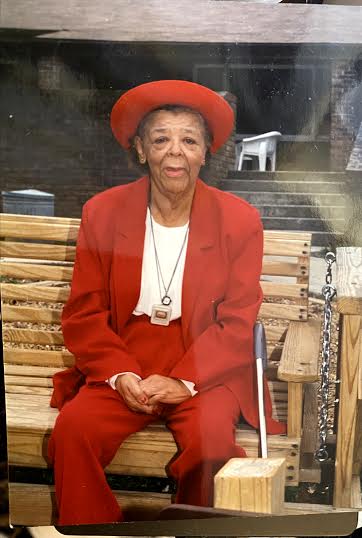
“She was a champion for education,” said Jenai Hayes, Collins’ granddaughter and a Tennessee public school teacher. “As a little girl, she would always tell me it’s your fundamental right to learn how to read and to be able to do mathematics. Those two things she said were the principles of being able to survive.”
Hayes carries that same wisdom and passion for learning into the classroom as a science educator with Metro Nashville Public Schools. She followed in the footsteps of not just her grandmother, but her late mother, Mary Brown, who was also an alumna of Tennessee A&I.
Hayes said her grandmother, who graduated with a degree in education, also strongly influenced her mother, who spent 24 years as a popular English and French teacher at Tennessee High School in Bristol, Tennessee, before becoming a member of Bristol’s school board.

While at Tennessee A&I, Mary Collins joined Sigma Gamma Rho Sorority Inc. It was there that she also met her future husband, Clyde Collins, Sr. Before graduating, Collins wrote 50 poems and short stories for elementary grades that were part of a graduation project. It wasn’t long after graduating that she began to make an impact as an educator.
Growing up, Hayes saw her grandmother’s desire to educate others firsthand when she went with her to the Job Corps in Bristol some Saturdays.
“She spent weekends, even while she was still working, teaching men how to read,” said Hayes, noting that the Job Corps in East Tennessee didn’t include women at the time. “She was so disturbed that so many of them didn’t know how to read.”
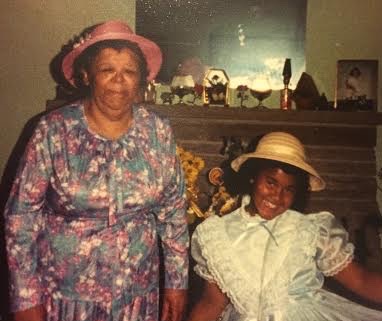
In addition to helping the men, Hayes said her grandmother also championed women becoming part of the Job Corps. Due to a large part of her effort, women were eventually incorporated, and the first female dormitory was named after Mary Collins.
Michael Carter, a TSU alum, is the residential supervisor at Jacob Creek Job Corps Civilian Conservation Center where Collins volunteered decades ago. Carter was close to Collins’ family growing up, and was also taught by her in the sixth grade when she was principal at Slater School for a couple of years during the integration of schools in East Tennessee.
Carter said Collins’ contribution to the Job Corps is still talked about today.
“When they did get the women in the program, she was out here teaching them etiquette and all sorts of things,” said Carter. “She would also bring things out here for them. She was just a giving person.”
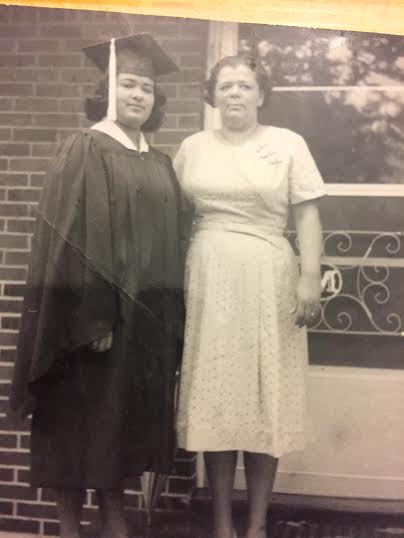
At Lincoln Elementary School in Bristol, where Collins was a teacher and principal for a number of years before integration, she was just as passionate about helping students, not just learn, but get necessities, like food and clothing.
Mary Brown, who died in 2016, talked about her mother’s benevolence and her legacy in a newspaper interview.
“A lot of times, she would watch the kids as they ate lunch and looked for the ones who didn’t have much – if anything at all,” said Brown of her mother, who sometimes took out loans to feed students, put shoes on their feet, and buy up-to-date books. “Then, my mother would go up the street to the corner store and buy luncheon meat for those kids, so they could have lunch, too. I looked at my mother’s passion and the love she put into teaching and helping children. And I said, ‘I want to do that, too. I want to … make that kind of difference.’”
Frances Worthington was one of many students at Lincoln Elementary whose life was impacted by Collins. Now 82, the Bristol resident recalled how Collins made it possible for her to attend school and get an education.
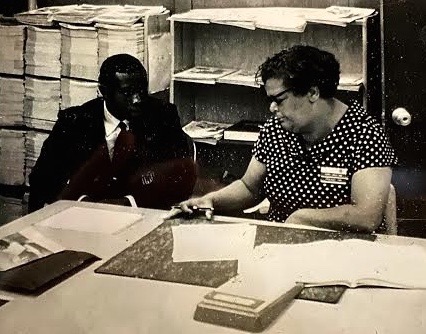
“I lost a lot of time in school because my mother had to go to work and I had to stay home and babysit my baby sister,” said Worthington. “Ms. Collins told my mother that I could bring my sister Margaret with me to school, and that she would not be any trouble. She was a loving person.”
Mary Collins passed away during Hayes’ first year in college. But before she died, Hayes said they talked about her becoming a teacher.
“She influenced me to the point I went to the Governor’s School for Teachers in 1993,” Hayes said of Collins, who was chosen to participate in a prestigious National Science Foundation program in 1961. “One of my proudest moments is her going with me and sitting at the table when we were graduating from governor’s school.”
Hayes said she hopes to enroll at Tennessee State University in the fall to pursue a doctorate and continue to be a “champion for education” like her grandmother, and mother.

“I want to be a part of their TSU legacy,” said Hayes.
Dr. Jerri Haynes, dean of the College of Education at Tennessee State University, said the College is “guided by the pioneering work of educational luminaries like Ms. Mary Collins.”
“Ms. Collins’ example of selflessness and dedication continues to impact the program’s emphasis on identifying and addressing the needs of all students, and tirelessly working to ensure that no child is left behind,” said Haynes.
Reflective of Ms. Collins’ life work, Haynes said the TSU Educator Preparation Program stresses competence and caring with the goal of producing graduates who are highly qualified and passionate about student achievement. She said the accolades bestowed upon TSU’s education programs and the success of the graduates are testimony to Ms. Collins’ enduring legacy of excellence.
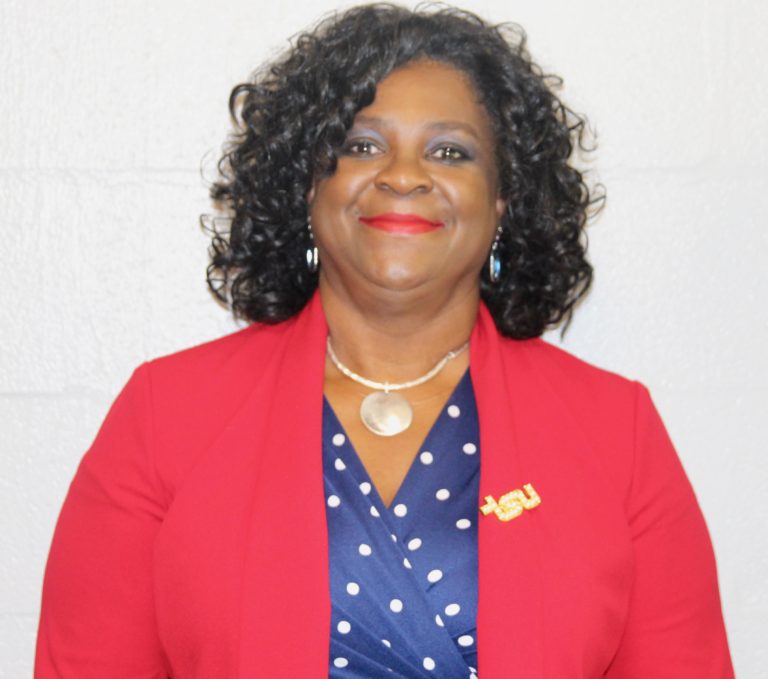
For instance, said Haynes, all programs in TSU’s EPP have been unconditionally approved by the Council for the Accreditation of Educator Preparation (CAEP) and by the State of Tennessee. Recently, the Elementary Education program was recognized by the National Council on Teacher Quality for its diversity of teacher candidates, placing the program’s diversity in the top 21 percent of all nationally reviewed institutions. The Educational Leadership program has also had success. TSU has supplied more principals and assistant principals to Metro Nashville Public Schools (MNPS) than any other institution.
“Indeed, graduates of TSU’s EPP are sought after by school districts inside and outside the state,” said Haynes. “This demand only further confirms the competence and caring TSU graduates offer, characteristics reminiscent of a pioneering TSU alumna, Mary Collins.”
To learn more about TSU’s College of Education, visit https://www.tnstate.edu/coe/
Department of Media Relations
Tennessee State University
3500 John Merritt Boulevard
Nashville, Tennessee 37209
615.963.5331
About Tennessee State University
Founded in 1912, Tennessee State University is Nashville’s only public university, and is a premier, historically black university and land-grant institution offering 39 bachelor’s degree programs, 24 master’s degree programs, and eight doctoral degrees. TSU is a comprehensive research intensive institution with a R-2 Carnegie designation, and has a graduate school on its downtown Avon Williams Campus, along with the Otis Floyd Nursery Research Center in McMinnville, Tennessee. With a commitment to excellence, Tennessee State University provides students with a quality education in a nurturing and innovative environment that prepares them as alumni to be global leaders in every facet of society. Visit the University online at tnstate.edu.
